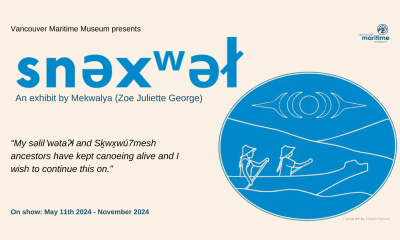Canada News
Diluted bitumen sinks when mixed with sediments, federal report says
VANCOUVER—Diluted bitumen, the molasses-like product that would be transported by the proposed Northern Gateway pipeline, sinks in salt water when battered by waves and mixed with sediments, according to a new study by the federal government.
However, when free of sediments, the crude floats even after evaporation and exposure to light, the study determined.
The report, conducted by Environment Canada, the Department of Fisheries and Oceans and Natural Resources Canada, also said that the commercial dispersant Corexit 9500 used in cleaning up conventional spills had a limited effect on dispersing diluted bitumen.
Whether the oil sinks or floats in the event of a spill has been a source of debate, pitting environmentalists against supporters of projects such as the Northern Gateway pipeline. Part of the argument has been that if the oil sinks to the ocean floor, it’s harder to recover.
The study examined two blends of crude, the Access Western Blend and Cold Lake Blend, which represent the highest volume of diluted bitumen, or dilbit, products transported by pipeline in Canada between 2012 and 2013.
“This work demonstrates that, in waters where fine- to moderate-sized sediment is present, these oils are at risk to sink, when there is a high degree of mixing energy available,” the report said.
The experiment compared the two dilbit blends to an oil used for marine ship fuel.
The oils were evaporated at what the paper said was a typical marine temperature range. They were also exposed to 120 hours of light under a UV lamp. The dilbit samples did not sink in either cases.
When mixed in a tube with salt water, the dilbit samples remained afloat. However, when mixed with three types of sediments of various sizes, the results differed.
“In general, mixtures with kaolin (a particulate) formed finely divided oil-sediment particles that sank in the salt water, with one exception for the highly weathered fractions for both AWB and CLB,” the report said.
“Mixtures with the larger particles of diatomaceous earth likewise dispersed and sank, though a portion of the oil remained unmixed and floating on the surface. Mixtures with the coarser sand, however, formed a single, continuous phase of floating oil-salt water entrained mixtures, and only a small portion sank as an oily sediment mixture.”
The study acknowledged that the tests were conducted in a synthesized environment, and it’s possible that oil products could behave differently in the natural environment—a point echoed by Owen McHugh, manager of emergency management with the Northern Gateway pipeline.
“What does that 12 hours of mixing really hard in a jar (become) equivalent to in the environment? That’s something that we need to do additional studies on,” McHugh said in an interview.
He said it is also important to consider the actual circumstances surrounding a spill.
“The wind and the waves, and the sediment concentration and how that spill is responded to will all affect the ultimate state of that oil.”
McHugh said he has conducted a similar study with similar results, and the findings were presented during public hearings on the pipeline project last year.
Karen Campbell, staff lawyer with Ecojustice, said the study reinforces what many environmental groups have suspected.
“If we now have a conclusion that says this stuff is going to sink and it’s not going to stay floating on the water, so you’re not going to be able to use skimmers, you’re not going to be able to use dispersants, then we actually have a much greater risk of the impacts of a spill,” she said.
“It changes the conclusions about the impact of the project.”
In the federal study, the dilbit samples were also placed in a wave tank facility in Dartmouth, N.S., to see how they would react to a chemical dispersant that has proven effective with conventional crude spills. In non-breaking waves, the oil remained on the surface.
But under breaking waves, the chemical caused only partial dispersion, the study said.
There is no record of chemical dispersant used on an actual dilbit spill, and since the composition of different dilbit varies, finding an effective dispersant may be challenging, the report concluded.
In 2010, roughly 843,000 gallons of diluted bitumen spilled from an Enbridge (TSX: ENB) pipeline into the Kalamazoo River in Michigan.
The oil was carried downstream during a flood. Even though much of it was sopped up, about 10 to 20 per cent mixed with sediment and sank to the bottom of the river, the report said.
Conducting research on how diluted bitumen would behave in a marine environment was one of the 209 conditions announced by a review panel that approved the proposed Northern Gateway pipeline in December.
The pipeline—if given final approval by the federal government—would carry diluted bitumen from Alberta’s oil sands to tankers on the British Columbia coast.
Campbell said she hopes the federal government will give the study some weight when it makes its decision.
“It was one of the more contentious issues in the panel deliberations, it’s got real implications for the safety of this project and what will really happen when the oil spill takes place,” she said.





















